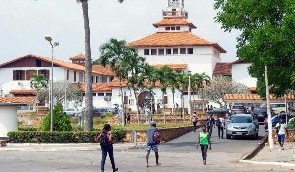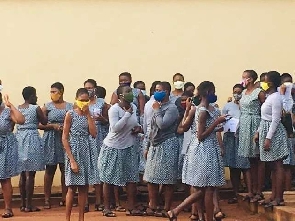A YEAR ago, precisely on February 9, 2007, shivers were sent down the spines of journalists across the country, particularly those in the Ashanti Region, following the gruesome murder of Mr. Samuel Best Ennin. The prolific journalist, then the Ashanti Regional Chairman for the Ghana Journalists Association (GJA), had his life cut short by unknown assassins at a Kumasi suburb called Pankrono.
A lot of theories were built at the time to suggest the possible motive behind that monstrous act, culminating in the apprehension among journalists, media admirers and freedom of speech advocates.
When the whole incident happened, what the whole society was made to understand was that nothing of any value or anything had been taken from Samuel Ennin and the other victims at the table, and all that the murderers had come to do was to shoot him and go away .
Suddenly, we were told a second story that a robbery incident took place and a mobile phone and other stuff were taken away, and that it was in the process that the former GJA Chairman was shot dead.
DCOP Frank Adu-Poku, leading the Ashanti Regional Police Command at the time, quickly arrested Kwame Ayew alias “Red” and Sheriff Kabore as the perpetrators of the heinous crime, but has since not put them before court. Mr. Adu-Poku, who is now the Director-General of Police Criminal Investigation Department (CID), told journalists at his last briefing on the case that all evidence pointed to the two “suspects” as the true killers of Samuel Best Ennin, even though the duo were already in police custody on different crimes committed.
This raised eyebrows and in spite of questions raised on the hasty and conclusive nature of the position of the police, the commander stood his grounds and insisted that “circumstantial evidence” pointed to Kwame Ayew (not the footballer) and Sherrif Kabore.
One year on the police cannot arraign the “suspects” before court for justice to be done although they had long taken the various rewards put out there by GJA and others. Mr. Commander, please what happened to the evidence? Could it be that the suspects are not the true killers of Ennin as you claimed earlier and that we still have the perpetrators in our midst?
In any situation, having an element of doubt or uncertainty hanging around your neck like an albatross, “reality testing,” which involves obtaining additional information to check your perception, is needed.
This is called healthy skepticism, and this concept calls for critical thinking, which requires an open mind. As the popular bumper sticker reads, “Minds and parachutes work only when they are open.” This means that a truly critical mind is open to new ideas and new evidence.
According to Sociologist Robert Turner, deciding that something can’t be true because you have never heard of it before is not critical thinking. Therefore, critical thinking means being open to new evidence and applying logic and reason to what you think, observe and presently believe.
Certainly, the case cannot go to rest or be allowed to die a natural death as stated by the Acting GJA Ashanti Regional Chairman, Nana Yaw Osei during a press conference in Kumasi to commemorate the one year anniversary of the death of late Samuel Best Ennin.
Despite the fact that it is difficult for the police to admit that they erred in taking a position on the matter, which sought to prejudice the case even before it could be taken to court for the law to take its course, they should be bold to tell the public about the error and start investigations afresh after all it is a known fact that investigations are expensive and take longer time to unravel mysteries about murders.
As Susan Blackmore said in 2001 when her studies caused her to abandon some long-held beliefs, “Admitting you are wrong is always hard though, it’s a skill that every psychologist has to learn.”
Then to journalists and the general public, just because a teacher, guru, celebrity or authority is convinced or sincere does not mean you should automatically believe him (or her). It is unscientific and self-demeaning to just take the word of an “expert” without asking probing questions like: what evidence convinced him? How good is it? Is there a better explanation?
It is healthier to change your views under the impact of new and more convincing evidence? Let us ask for the test of claims (if any) that are being made by the police and the nature and quality of the test to establish its credibility. My perception still remains unchanged – the police have not arrested any killer, if it has they should be prosecuted.















